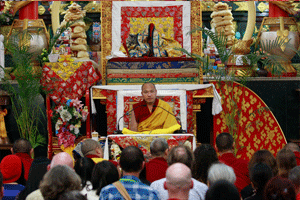22ND Feb –Vajra Vidhya Institute, Sarnath.
Beginning several hours before the scheduled teaching time, hundreds of people began to gather at the Vajra Vidya Institute gompa for the second day of the Gyalwang Karmapa’s Spring Teachings. With Khenchen Thrangu Rinpoche once again in attendance, together with Tulkus and Khenpos, monks and nuns, and international and local devotees, the gompa was quickly filled to capacity. A large group of students from the nearby Central University of Tibetan Studies gathered, while a growing webcast audience also tuned in live from across the world, all eager to absorb the Gyalwang Karmapa’s vast and profound wisdom.
As the rain of dharma continued for a second day, the Gyalwang Karmapa opened the teaching by once again reiterating the urgency to practice the dharma right now, in this very moment.
“We need to practice the dharma from now. We need to do it on this very seat, in this very session. It’s right now that we need to begin the dharma. If we postpone it, if we think to ourselves I’m going to do it tomorrow or the next day, then we will not be able to really practice the dharma well. It’s important to understand this.”
From this urgent call to practice, the Gyalwang Karmapa then turned his attention to making sure that we do it properly. He observed that there are many people who wish to practice the dharma, but don’t truly know how. By focusing mainly on the external appearances of our practice without carefully checking our mind, we can easily fall into the trap of spiritual materialism.
“Sometimes when we practice dharma we think that we need to show some sort of external or physical sign of it. We pay a lot of attention to the rituals and these actions of our body and speech. This is practicing dharma when we’re focusing outside. But instead what we need to do is turn our attention inwards. We need to see whether what we’re doing is functioning as an antidote to the afflictions or not. We need to see whether we are taming our mind or not. We need to see whether our mind is improving, getting kinder, or not. If we don’t look at it in this way then there’s no benefit to doing these actions – we think that we are trying to do the dharma, but actually we are just making a show with our body and speech. We are putting on appearances, and that’s all we really take an interest in. And the moment that happens, this becomes spiritual materialism.”
Expanding his focus to the wider twenty-first century world we inhabit, the Gyalwang Karmapa touched on both the ways it shapes us as people and the ways that we as individuals in turn can shape it. Observing the growing trend towards materialism in the modern world, he encouraged the audience to look beyond the idea that happiness can be found outwards in external things.
“These days in the 21st century it’s a very materialistic time. Most of the time, we don’t really know what true happiness is. Many people have the idea that external things and external conditions will bring them happiness, and will lead them to the real meaning. But when we think about material things, the more we have of these things the more disturbances we have. The more difficulties we have. Things get more and more problematic. We have more and more busyness, and what happens then is that we lose ourselves. We lose our nature, what really is there.”
Continuing his exploration of our place in the modern world, the Gyalwang Karmapa skillfully reminded each person of the important role they play in shaping an increasingly interconnected and ever-more deeply interdependent world.
“In this Information Age people are developing closer and closer connections with each other. All the people in the world are seeing that they have greater mutual connections. It has become very clear to us that these are deeper and stronger connections. When we think about our own good acts and wrong acts, we can see more clearly how they have an effect on the world. We can see that the individual things that we do are connected to the benefit or the harm of the world. They are deeply connected to the happiness and suffering that is in the world. The good and bad acts of one person are becoming the good and bad of the world. When we examine the good and bad that we do, we can see that it is becoming even more profound and even more vast. It’s the good and the bad that people do that determine on a fundamental level if there is peace or happiness in the world. It’s very tightly connected.”
Recordings of the Gyalwang Karmapa’s Spring Teachings are available on YouTube in English and Chinese, and are also available for download the day following each teaching session. The live webcast steam can now also be accessed on all mobile devices, including iPad, iPhone, Android, etc.



